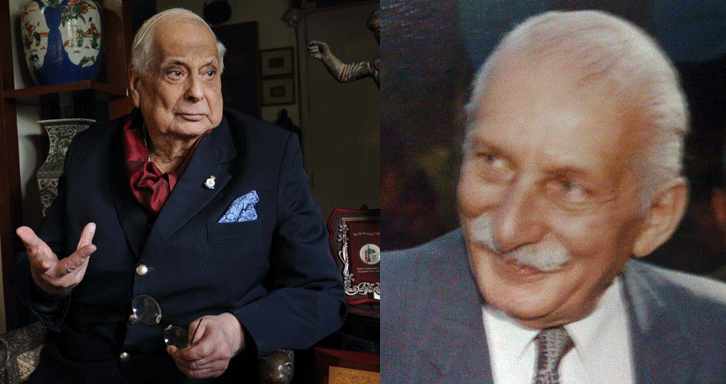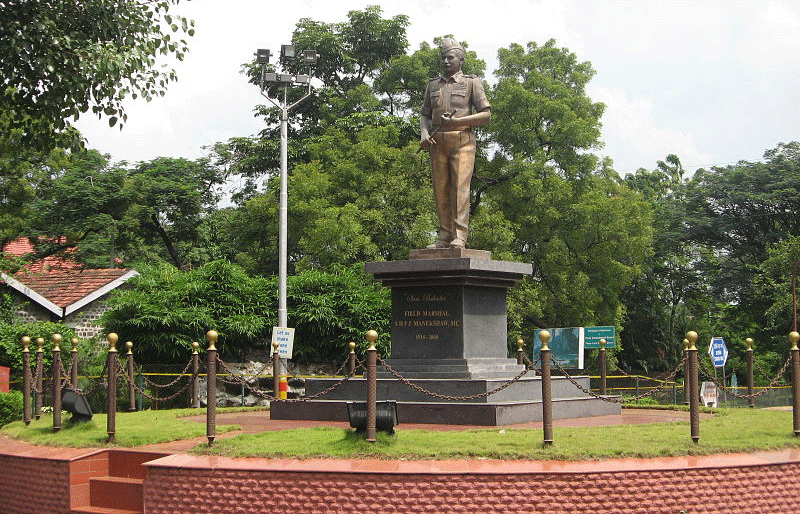
A Jew whose family migrated to India some 200 years ago, Gen Jacob joined the army to fight the Nazis. During those days of the Second World War, there were so many people to be trained and hardly enough infrastructures as a result most of the basic of soldiering he learnt was on the battlefields in Middle East, Burma and Sumatra. In close to five years he almost got a chance to fight the Germans but his regiment was cut to pieces and he himself was wounded in Burma. On another occasion when fed up with the tyranny of Gen Kaul he was on the verge of putting up his papers when Gen PP Kumaramangalam who later went on to be the 7th Chief of the Indian Army. Kumaramangalam played the role of guiding angle and protected him.
This is what applies to Lt Gen (Retd) JFR Jacob the largely ignored Chief of staff of Eastern command who mastermind, planned, conducted and controlled the operations of 1971 war. He was the one who flew down to Dhaka to ‘blackmail’Gen Naizi to surrender along with 93,000 troops, an unprecedented military surrender in military history before and after World War II.
Apart from that he raised a regiment, commanded a brigade, a division and raised a corps (16 corps) and was the Eastern army Commander.
But what did he get in return? No special Military honour, not even a civilian Padma Award as P Chidambaram the head of the Padma Award Committee felt he was unfit for the award. What he got was a sop in form of routine Param Visistha Seva Medal PVSM which today almost all Generals get without even fighting a war, merely on completion of certain years of service before retirement. The only solace he gets is when the people of Bangladesh invite him as the man who won them freedom from Pakistan. Even the enemy acknowledges him. The official history of 1971 war compiled by Pakistan’s National Defense College says, “the credit really goes to General Jacob’s meticulous preparations in the Indian eastern command and to the implementation by his Corps commanders.”
In his book Surrender at Dacca: Birth of a Nation Jacob asserts that the Bangladesh war was only successful because of his own efforts. And that both General Manekshaw and GOC-in-C Eastern Command Lt Gen JS Arora took away all the credit. According to Jacob, Manekshaw liked to have ‘yes’ men around him, while the Eastern army commander Lt Gen J.S. Aurora – his immediate superior was self-centered.

Taazakhabar News: There is a saying that you didn’t like Field Marshal Sam Manikshaw?
Gen Jacob: No, that is not true. I liked him. Sam and I were good friends. I don’t know why people ask such questions. He was a friend of mine; I may not agree with him professionally that’s a different thing. His idea was if we took Khulna and Chittagaon we would have won the war. Dhaka was never his objective. That is where we differed. But that does not mean I disliked him. He was a friend. I liked him. He was a good man.
Taazakhabar News: When did you first meet Sam Manikshaw and what equation you shared with him?
Gen Jacob: I had known Sam Manekshaw since 1950. He was working at the Army Headquarters as Director MilitaryOperations. He used to call me to help him clear his files…. He gave me a dog… his name was Ponty. We became good friends. We disagreed professionally but how does that matter… I disagree with so many people professionally
Taazakhabar News: What about gen Arora?
Gen Jacob: He too was a good chap. We all did our duties. Professionally we may not have agreed on so many things but then I am entitled to my military views.
Taazakhabar News: Who were the prominent Chief of Army staffs during you time?
Gen Jacob: Sam Manekshaw was a good chief. He fought for the army…
Taazakhabar News: Did you happen to come across Gen Cariappa also?
Gen Jacob: Yes I did. I knew him as a Lt Col and met him frequently later. I have a great regard for Cariappa. He was what the Army needed as Chief.
Taazakhabar News: Was it fair to make him Field marshal after Manekshaw?
Gen Jacob: I don’t rate Field Marshals.
Taazakhabar News: Personally, how do you compare the two?
Gen Jacob: Sam was a great guy. Cariappa too was a very good chief. The Army needed just a man like him. He was a great disciplinarian.
Taazakhabar News: Any examples of Bad Chiefs? What about Gen Kaul?
Gen Jacob: Gen Kaul…. God. I had lots of problems with him. I served with him. We did not get along at all. In 1962 both Sam Marshal and I were instructors at the Staff College, Wellington. Sam Manekshaw was a Maj General and I was a Lieutenant colonel. Gen Kaul was my divisional Commander. We had numerous problems.
Taazakhabar News: You have written about him in your book?
Gen Jacob: Kaul detested me… because I refuse to take part in building houses instead of training troops. He wanted us to be house builders instead of soldiers…
Taazakhabar News: In your book you have written that Maneshaw liked yes men?
Gen Jacob: Yes… It is true He was very susceptible to flattery. But he was a good man. I am very fond of Sam.
Taazakhabar News: How does one distinguish between a good officer and bad officer?
Gen Jacob: I can’t tell you the difference between a good and bad officer…
Taazakhabar News: There might be some difference between a good and a bad general in the soldiering perspective?
Gen Jacob: A good general is one who knows his men. Man management is very important. If you are inefficient and you don’t look after your men, you are no good at all. We were happy and lucky to get good Chiefs like Cariappa and Maneskhaw who were both very upright and capable officers.
Taazakhabar News: Gen Kaul was the other extreme?
Gen Jacob: Gen Kaul and I were at logger heads… He was my Div commander… He and I did not get on one bit. He was responsible for what the army says fixing me. He tried to fix me because I did not want my men to build houses instead of training for war.
Taazakhabar News: Is this tendency of fixing soldiers, setting them right or booking people’s careers– a very common or popular trend in the army?
Gen Jacob: I would not say it is popular… but it is a nasty trend… It is there….But it is not a popular trend. The Army is fair. In the army if you are a good soldier and look after your men, you will prosper… but if you are lazy and don’t look after your men you will not prosper…
Taazakhabar News: Do you think Army officers should accept Governorship?
Gen Jacob: Why not? They have been administrators. They have seen action. They know what the problems are. They understand life. They know man management. They know how to manage people. They are good and efficient administrators. So why should they not.
Taazakhabar News: These days there is a trend for IAS and defense officers to seek Governorship as a post retirement sop from the government?
Gen Jacob: Army officer are valued for their efficiency. When I joined as governor of Goa in 1998 there was political instability in the state. It was like musical chairs. State governments were collapsing. The economy was in a shambles and the state was virtually bankrupt. Finally, in 1999, Governor’s rule was imposed. The ordinary citizens were so happy that there were demands that Governor’s rule should be extended. Again as a Governor of Punjab I did a lot of good work in Chandigarh.
Taazakhabar News: What do you have to say about the condition of Jews who have found refuge in India?
Gen Jacob: India has looked after the Jews… Jews have lived in India for 2000 years in Cochin. They had been traders since king Solaman’s times. India is a hospitable country. It’s a wonderful country we got shelter here. Jews are Indian citizens they have prospered in India. There has never been any anti Semitism in India.
Taazakhabar News: You had a role to play in opening the doors for Indo-Israel friendship. How is that helping India?
Gen Jacob: Israel is providing India with a lot of military expertise.
Taazakhabar News: One last question do you sometimes feel confused about who you actually are?
Gen Jacob: I am proud to be a Jew, but first and foremost I am Indian. I was born in India and served her whole my life.

